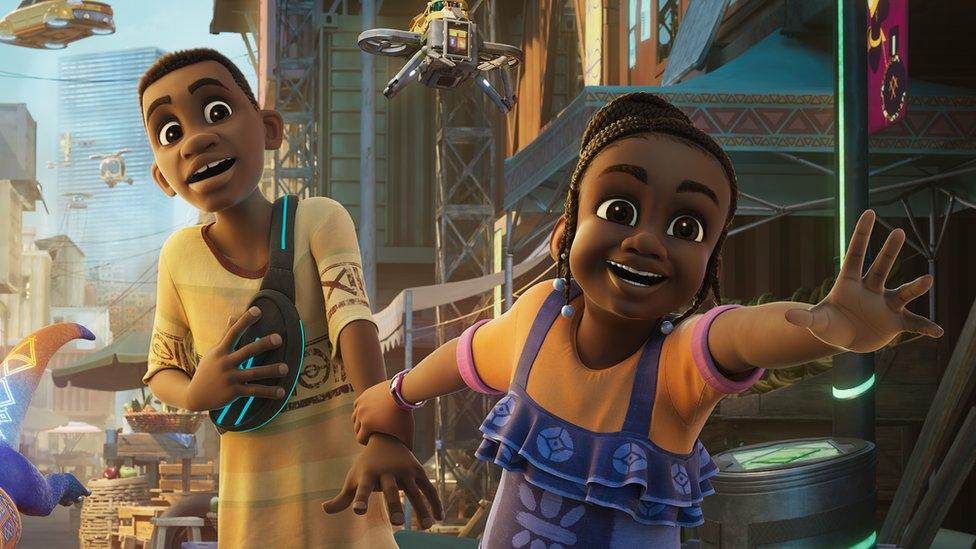Iwájú: Nigerian Disney show flawed but delightful - critics
- Published

Iwájú follows the adventures of a young girl growing up in a futuristic version of Lagos
The reviews are in - critics say new Disney+ show Iwájú has "top-notch" animation, "stellar voice acting" and is a "delightful" depiction of a futuristic Nigeria.
Although some critics say Iwájú is flawed, they also point to the inventiveness of the series, which reportedly marks the first time the Disney+ streaming platform has collaborated with an external production company.
The company in question is Kugali, an outfit led by three friends from Nigeria and Uganda who want to boost the representation of African animation and graphic novels.
Iwájú, their newest creation, centres on Tola, a young girl navigating a sci-fi version of Nigerian megacity Lagos. Luxury cars fly over the city's markets, supervillains are armed with bionic arms and AI pets are a must-have item.
The six-part series features Nigerian Pidgin - a mix of English and local languages - and all characters are voiced by actors from the West African country.
After the series was launched on Wednesday, UK newspaper the Guardian, external gave it a four-star rating, calling it a "delightful coming-of-age adventure" that is "an encouraging step into a bold and brilliant future".
However, the review also notes that Iwájú was "frantically paced and hard to follow".
US entertainment site Screengrab also criticised the show's pacing, as well as its character development.
But "top-notch animation" distracts from these issues, it says.
Screengrab awarded Iwájú three-and-a-half stars, saying: "The exploration of economic inequality through its characters is multifaceted.
"Not everyone is able to utilize the same amount of technology, something touched upon by the show's story."
Despite Iwájú receiving largely positive reviews from critics, several Nigerians have complained on social media that although the show focuses on Nigeria, they cannot watch it as Disney+ is not available in their country.
"Disney really isn't serious though. Iwájú's dropping in like five days and Disney+ still isn't available to us," a user on social media platform X wrote prior to the show's release.
After initially announcing that Iwájú would stream exclusively on Disney+, the company said Nigerians who subscribe to DSTV would be able to watch the show on the Disney Channel, where it will air in late April and early May, Nigerian media reports say.
In other reviews, ABC News in Australia says: "Iwájú is both uniquely African, and yet universal in its appeal... every intricate detail has been thought of." Elsewhere, US news website Mashable says the "gorgeous" show "dreams up some seriously covetable gadgets".
Following Iwájú's release, social media users that could access the show were also largely positive, calling it "an instant classic" and "authentic".
Nigeria's culture minster is among Iwájú's fans. At the show's premiere in Lagos, Hannatu Musawa said: "This is huge for Nigeria because at last we now have our own stories being told from our own perspective.", external
Disney first approached London-based Kugali to collaborate after the start-up was interviewed by BBC News in 2019.
In the video, Kugali co-founder Hamid Ibrahim, vowed to defeat Disney in the African market.
Last week, in a short documentary about the making of Iwájú, Mr Ibrahim recounted that first interaction with Disney, external.
"You just called them out," he says. "Then someone reaches out saying: 'Hi' - that they're from Disney - 'want to talk?'"
Kugali co-founder says his company will take on Disney
Mr Ibrahim says he hopes the project will spark meaningful change.
"I hope Iwájú launches the next generation of artists," he says in the Iwájú documentary. "I hope it's a point of inspiration for artists all over the world."
In its review of Iwájú, the Guardian notes that Iwájú taps into Afrofuturism, a movement that uses science-fiction and technology to imagine a future which centres on black communities - think Marvel's Black Panther and Janelle Monae's Grammy-nominated album Dirty Computer.
Iwájú, which actually means future in the Yoruba language, is "specific in it's Afrofuturism" by presenting a "solid sense of the Nigerian identity", according to the review.
But that doesn't mean viewers outside Nigeria won't be able to relate to the story.
The review assures: "Even if you don't know your suya [grilled meat] from your puff-puffs [donuts], there are plenty of universal themes - self-identity, family, independence - to grab on to."